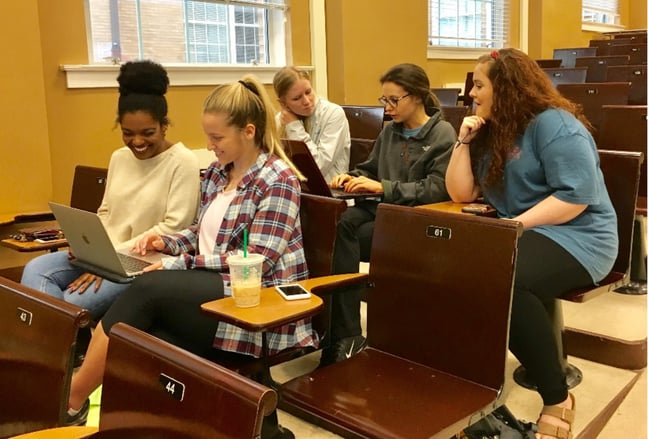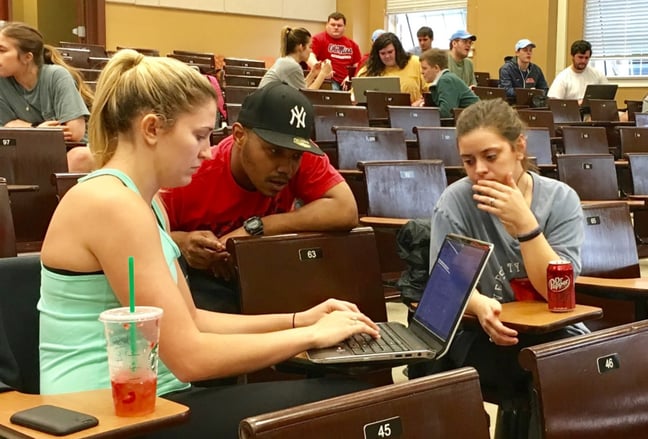 Patricia O’Sullivan is the manager of the APLU Personalized Learning and Adaptive Teaching initiative and an adjunct instructor of ethics and pharmacy administration at the University of Mississippi.
Patricia O’Sullivan is the manager of the APLU Personalized Learning and Adaptive Teaching initiative and an adjunct instructor of ethics and pharmacy administration at the University of Mississippi.
She partnered with Realizeit to convert her Pharmacy Ethics course for the Fall 2016 semester, and has just completed her second term with her new course. We interviewed Patti to get her perspective on why she implemented Realizeit, and what her experience has been so far.
Q: Can you describe the main problem you were trying to solve by implementing Realizeit?
A: I was trying to solve the problem of increasing enrollments and low engagement in a class that was originally set up to be a discussion class, but had to become a lecture class because the number of students was growing every year. I added some sections, but I couldn’t subdivide them any further because of space and scheduling issues.
At first, I added some online elements, but I couldn’t track whether students were actually completing the work on the system. In fact, I knew they weren’t, because they were clearly coming to class unprepared.

Q: What was your number one reason for trying Realizeit?
A: It began with a recommendation from a colleague. I didn’t know much about adaptive learning, but she did; it was her specialty, and I trusted her judgement.
I went to the WCET conference with her, where we saw several people speak about adaptive learning, and when I listened to Realizeit’s CEO, I was really impressed. Of all the people presenting their adaptive learning solutions at that conference, Manoj was the only one who took a pedagogical approach rather than a salesperson’s approach. He was focused on the impact Realizeit is having on students.
What sealed it for me was seeing the Realizeit system in action and recognizing that it offered a solution to the problem of being able to track students’ interaction with the content and their comprehension of the material, with the bonus of them knowing I was watching what they’re doing in the system. That’s important—I’ve surveyed them, and they tell me they’re more likely
to watch a video or do the reading when they know I can check up on them.
Q: What’s the number one reason you’ve chosen to continue with Realizeit now that your pilot is complete?
A: In my position as adaptive learning program manager, I’ve gotten to know many other so-called adaptive products that other colleagues are using. They are overwhelmingly frustrated with the fact that they can’t edit the content easily, if at all. I would even say some of them feel betrayed by the promise of adaptive learning.
With Realizeit, I don’t have that problem, and seeing some of these other programs in action affirms in my mind that I’m glad I have control over the content—not to mention the data provided by the learning analytics.
Q: Describe what your course was like before implementing Realizeit.
A: Before Realizeit, my course was content-based. It was hard to engage students in discussion with me lecturing. All the talking came from my side of the room.
And based on their evaluations, they described the class as “typical” – not boring, but they saw it as a requirement they had to check off or a hoop they had to jump through since it was a required course in their program.
Q: Describe what your course is like after implementing Realizeit.
A: After Realizeit, my course is concept-based. Now students learn the content outside class, and when they come to class I can engage them in active learning exploring concepts. Students see the class differently – they’re much more prepared and engaged. They actually talk to each other, and I know they’re doing the work because I can “see” it in the system.
Plus, my TA and I can now circulate among the groups and build rapport with students, in a way we couldn’t before.

Q: What is different about your lesson planning now that you’ve implemented Realizeit?
A: I’m now able to facilitate cooperative learning, the type of teaching I used to do at the high school level years ago. With Realizeit I have been able to bring that back – group work and team work.
That simply wasn’t possible with the high enrollments I had forcing me to fall back on lectures.
This is a major reason why I’m encouraging other teachers to incorporate adaptive learning into their courses. When they flip their classrooms like this, they can get away from lecturing and passive learning and, instead, create an active learning environment where students take the initiative in their learning process.
Q: Has there been any change to your office hours?
A: Yes. Before Realizeit, students only came to me around exam time, if they were concerned about what they needed to know for the test. They were asking how they could regurgitate the content to get the best grade. Or they came after the exams if they’d done poorly and wanted to find out how they could make up ground.
Now, they come to ask for help with their learning, for details about assignments: did I go into enough depth here? Or they’re asking for help with their group: my team disagrees on a point; how do we resolve that?
Q: Have you solved your original problem yet?
A: I’d say yes. Just from observational evidence alone, it’s obvious that the students are much better prepared and engaged. Also, I had a meeting with my chair recently, and we compared the student evaluations between last spring and this past fall, which was the first term with Realizeit. Student satisfaction scores jumped five full percentage points, which is quite significant.
Q: Are you more or less excited than you were before you started your journey into personalized, adaptive learning?
A: More excited—because I am seeing results and I can see so many ways now to improve them even more. I’m also excited because the process of building the course is behind me. During the whole first-run, I was learning the ropes of how to teach an adaptive course.
Now I feel more comfortable, and I’ve gotten to the point where I can edit the content in a real-time manner. I can add new issues in health ethics that have come up over the last year, and I can add them easily. So the hard part is done; it’s all upside from here.
Q: What’s the reaction from your peers been like?
A: Initially, my chair, who was a fellow instructor previously, felt a little wary of the idea of eliminating lectures – he seemed to think I was breaking a tradition of how to educate college students. Now, he realizes how innovative this is, and the potential it has to improve student outcomes at scale. When he saw the data, it really showed him how Realizeit adds value to students’ education. In fact, he’s put me in touch with other program chairs, and is ready for me to work on this at a larger scale.
Q: What advice would you give to a fellow faculty member thinking about implementing personalized, adaptive learning?
A: I have advice on two dimensions.
The first is for those teaching first-year or high enrollment courses. I tell them, you’re boring these kids to tears with conventional teaching – the kind of learning these students do with Realizeit is what they’ve already been doing in high school. I also point to the learning analytics—teacher and students can see where each student stands with his or her progress and grades every step of the way. Everyone is looking at the same data in real time.
The second is for those teaching beyond the first year. I point out that adaptive learning lets you teach to the top of your training. Often lectures devolve to the most basic level, and I think that’s incredibly frustrating for faculty, to constantly present the same material over and over again to the lowest common denominator. Realizeit frees faculty to go deeper into what they teach, confident that students are getting the foundational knowledge they need through Realizeit outside of class.
Learn More
Discover how Realizeit’s personalized learning and adaptive teaching system can help you and your students reimagine how you teach your courses while respecting your domain expertise and teaching style. Contact us today at (847) 241-4577 or click below to request a demo!

Photographs courtesy of Patti O'Sullivan, University of Mississippi